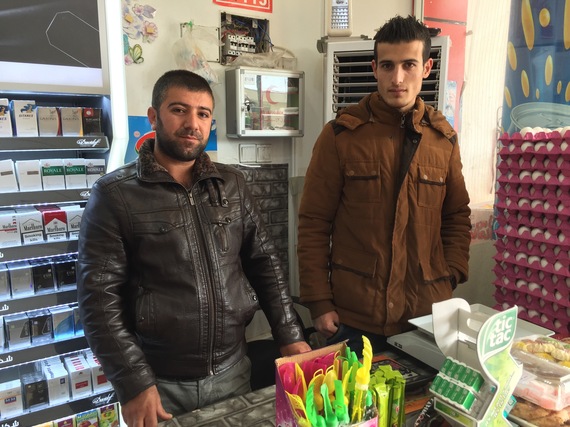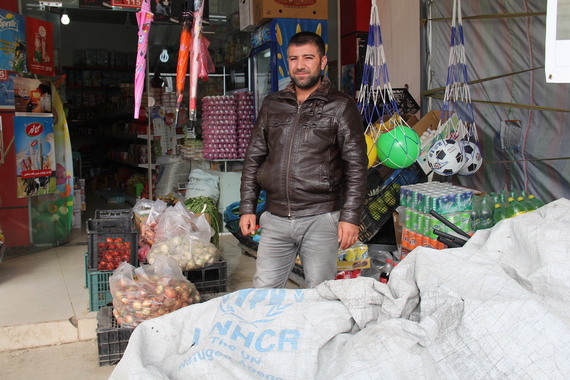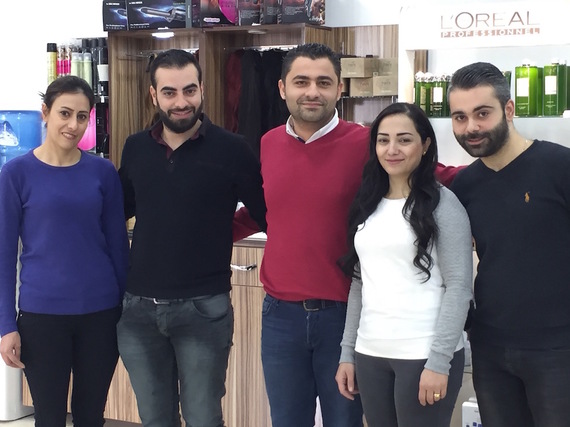In London this week, high level delegates from more than 70 governments, together with UN, non-governmental and other organisations, will be discussing the Syria conflict, now entering its sixth year. The challenge is how to better provide humanitarian assistance to those affected, both inside Syria and in neighbouring countries, which are hosting more than four million refugees. One of the issues will include how to help create jobs for people affected by the conflict, offering them greater hope for the future. Caroline Gluck, Senior Public Information Officer with UNHCR in Iraq, has met some refugees who have managed to set up their own businesses in Sulaymaniyah, northern Iraq
Bahoz Jalal Ismail, 25 and his assistant, Fadhil, both Syrian refugees, can be found at their small grocery shop in Sulaymaniyah, hard at work seven days a week and well into the night. "We won't go home until the last customer leaves", Bahoz tells me.
Bahoz used to work in a barber's shop back in his village, in Qamishly. But, he says, due to conflict and insecurity, business was bad and he could barely make ends meet.
He's proud of what he's achieved so far. Bahoz, who left Syria in 2013, noticed a gap in the market. His neighbourhood had no local shops and there was a university nearby, making it a good spot to attract customers. Borrowing $6 000 to rent and stock the shop, called Gul Bahar (Spring Flower in English), he began just selling fruit and vegetables, soon expanding to include a wide range of grocery items.
It got so busy that he soon hired another Syrian refugee, 21 year old Fadhil Hussein, to work alongside him. Bahoz and his assistant
Bahoz and his assistant
"Financially, this business is better than working in the barber's shop", Bahoz told me.
Unlike some of Syria's neighbours, in the northern Kurdistan Region of Iraq (KR-I) where 97% of Syrian refugees stay, refugees who have valid residency documents have the right to work.  Bahoz outside his grocery store Many enterprising Syrians, like Bahoz, have opened up their own businesses, providing local services as well as employing others. All, like Bahoz, spoke of the relief at being able to work and to support their family, giving them a sense of pride and dignity.
Bahoz outside his grocery store Many enterprising Syrians, like Bahoz, have opened up their own businesses, providing local services as well as employing others. All, like Bahoz, spoke of the relief at being able to work and to support their family, giving them a sense of pride and dignity.
"It's good for someone to work, to rely on themselves, not be a burden on anyone, to support their family and even employ somebody", said Bahoz.
Across town, in a beauty salon, customers are having their hair washed and cut. The salon is jointly owned by two Syrians, originally from Aleppo, and employs six staff - five Syrian refugees and one Iraqi national who fled conflict in Qaraqoosh, Mosul Governorate.
One of the owners, 32 year old Bashar Naoum, also works as a manager in a hotel in town.  Bashar (red jumper) and some of the staff at his beauty salon
Bashar (red jumper) and some of the staff at his beauty salon
"Having a job is very, very important", said Bashar. "It will make people rely on themselves without needing or waiting for hand-outs, and you can live with dignity. "Syrians are very hardworking people", said Bashar. "Unfortunately, our situation means we need some sort of help at the beginning. But, otherwise, we don't want to be a burden on society. If we have an opportunity, we can prove we are willing to take it and can stand on our feet."
Follow developments; .@refugees .@SupportSyrians .@UNHCRIraq #SupportSyrians
UNHCR In Iraq :@UNHCRIraq; www.facebook.com/UNHCRinIraqwww.unhcr.org.uk
Our 2024 Coverage Needs You
It's Another Trump-Biden Showdown — And We Need Your Help
The Future Of Democracy Is At Stake
Our 2024 Coverage Needs You
Your Loyalty Means The World To Us
As Americans head to the polls in 2024, the very future of our country is at stake. At HuffPost, we believe that a free press is critical to creating well-informed voters. That's why our journalism is free for everyone, even though other newsrooms retreat behind expensive paywalls.
Our journalists will continue to cover the twists and turns during this historic presidential election. With your help, we'll bring you hard-hitting investigations, well-researched analysis and timely takes you can't find elsewhere. Reporting in this current political climate is a responsibility we do not take lightly, and we thank you for your support.
Contribute as little as $2 to keep our news free for all.
Can't afford to donate? Support HuffPost by creating a free account and log in while you read.
The 2024 election is heating up, and women's rights, health care, voting rights, and the very future of democracy are all at stake. Donald Trump will face Joe Biden in the most consequential vote of our time. And HuffPost will be there, covering every twist and turn. America's future hangs in the balance. Would you consider contributing to support our journalism and keep it free for all during this critical season?
HuffPost believes news should be accessible to everyone, regardless of their ability to pay for it. We rely on readers like you to help fund our work. Any contribution you can make — even as little as $2 — goes directly toward supporting the impactful journalism that we will continue to produce this year. Thank you for being part of our story.
Can't afford to donate? Support HuffPost by creating a free account and log in while you read.
It's official: Donald Trump will face Joe Biden this fall in the presidential election. As we face the most consequential presidential election of our time, HuffPost is committed to bringing you up-to-date, accurate news about the 2024 race. While other outlets have retreated behind paywalls, you can trust our news will stay free.
But we can't do it without your help. Reader funding is one of the key ways we support our newsroom. Would you consider making a donation to help fund our news during this critical time? Your contributions are vital to supporting a free press.
Contribute as little as $2 to keep our journalism free and accessible to all.
Can't afford to donate? Support HuffPost by creating a free account and log in while you read.
As Americans head to the polls in 2024, the very future of our country is at stake. At HuffPost, we believe that a free press is critical to creating well-informed voters. That's why our journalism is free for everyone, even though other newsrooms retreat behind expensive paywalls.
Our journalists will continue to cover the twists and turns during this historic presidential election. With your help, we'll bring you hard-hitting investigations, well-researched analysis and timely takes you can't find elsewhere. Reporting in this current political climate is a responsibility we do not take lightly, and we thank you for your support.
Contribute as little as $2 to keep our news free for all.
Can't afford to donate? Support HuffPost by creating a free account and log in while you read.
Dear HuffPost Reader
Thank you for your past contribution to HuffPost. We are sincerely grateful for readers like you who help us ensure that we can keep our journalism free for everyone.
The stakes are high this year, and our 2024 coverage could use continued support. Would you consider becoming a regular HuffPost contributor?
Dear HuffPost Reader
Thank you for your past contribution to HuffPost. We are sincerely grateful for readers like you who help us ensure that we can keep our journalism free for everyone.
The stakes are high this year, and our 2024 coverage could use continued support. If circumstances have changed since you last contributed, we hope you'll consider contributing to HuffPost once more.
Already contributed? Log in to hide these messages.
 Bahoz and his assistant
Bahoz and his assistant Bahoz outside his grocery store Many enterprising Syrians, like Bahoz, have opened up their own businesses, providing local services as well as employing others. All, like Bahoz, spoke of the relief at being able to work and to support their family, giving them a sense of pride and dignity.
Bahoz outside his grocery store Many enterprising Syrians, like Bahoz, have opened up their own businesses, providing local services as well as employing others. All, like Bahoz, spoke of the relief at being able to work and to support their family, giving them a sense of pride and dignity. Bashar (red jumper) and some of the staff at his beauty salon
Bashar (red jumper) and some of the staff at his beauty salon